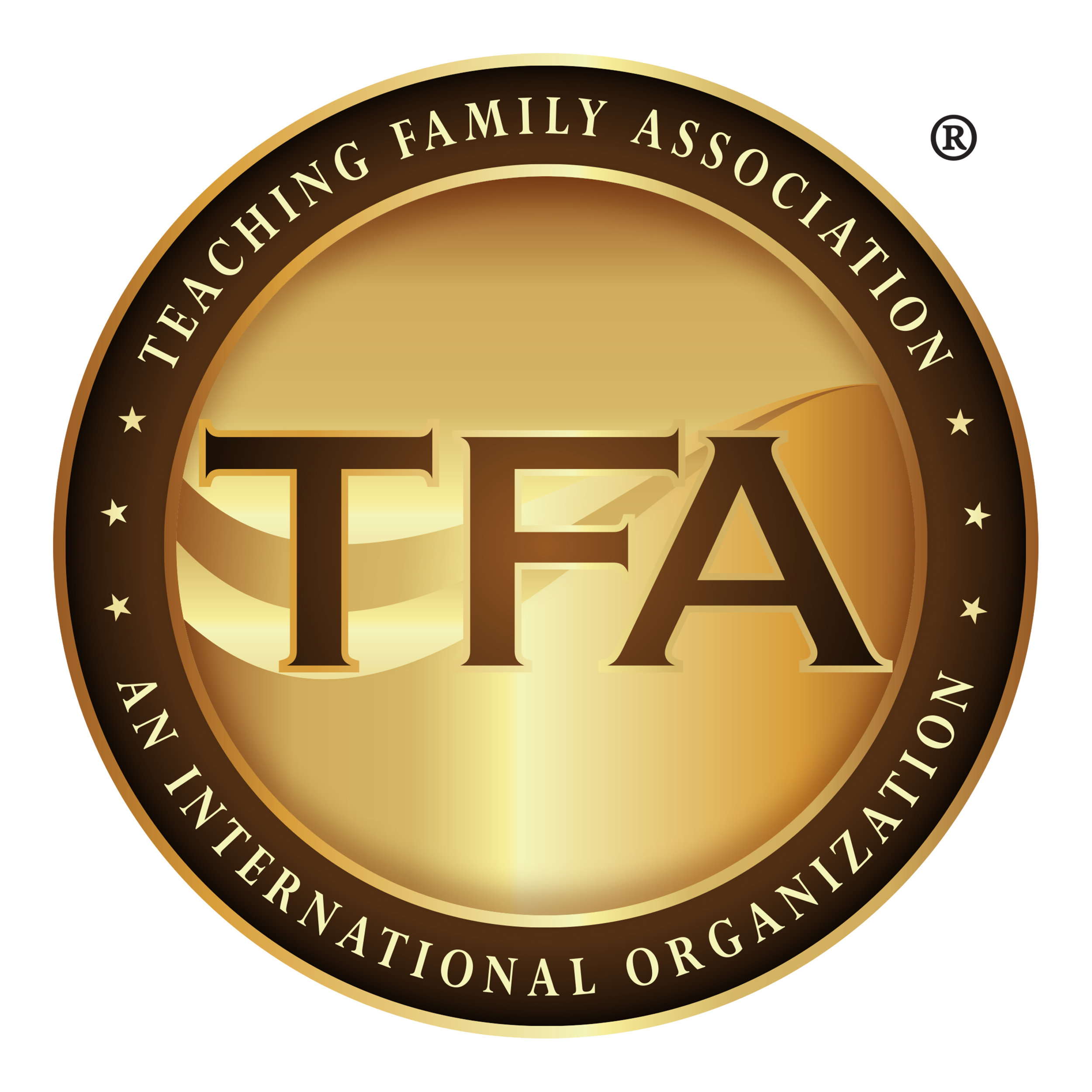Frequently Asked Questions
>> TFA® is trademarked: only agencies listed on our website as accredited or developing can claim credbility in implementing the teaching-family modlel.
Fidelity - "testing, analysis and evaluation of knowledge, skills and abilities of others to determine conformity with established accreditation standards....and certification standards...in the field of human services" - sets TFA’s Teaching-Family Model programs, services, care, staff, and treatment apart.
>> what issues does the Teaching-Family Model help with?
The Teaching-Family Model was developed as a trauma-informed, behavioral intervention using effective, strength-based teaching with a high degree of positive feedback, and thus can directly address any behaviors resulting in problems for children, teens, adults, and families.
The Model has been proven and is used effectively with individuals who have behavioral or emotional problems, depression, anxiety, post-traumatic stress disorder (PTSD), attention-deficit disorder (ADD) attention-deficit hyperactivity disorder (ADHD) obsessive-compulsive disorder (OCD) and oppositional defiant disorder (ODD), among other behavioral and mental health issues.
>> What populations does the Teaching-Family Model serve?
The Teaching-Family Model can be adapted to any environment. TFM services have been demonstrated as effective for children and youth who are abused, neglected, at-risk, juvenile delinquents, youth in the foster care system, developmentally disabled youth and adults, the severely emotionally disturbed, and families/parents at risk of having children removed.
The Teaching-Family Model is effective for all ages, and the implementation-dissemination systems have been adapted to effective parent training programs for in-home services for families at risk of having children removed. TFM is adapted and demonstrated successful outcomes in classrooms and schools, hospitals, shelters, assessment centers, multi-purpose programs, independent/transitional living, foster care, campus and community-based, and other settings.
>> Is the Teaching-Family Model recognized as an evidence-based treatment?
Yes. The Teaching-Family Model has 50+ years of in-context, outcomes-oriented research evidence. For 20 of those years, dissemination-implementation research on the Teaching-Family Model was funded by the National Institute for Mental Health.
The Teaching-Family Model was formally recognized by the American Psychological Association as an evidence-based practice in 2003. The Model is also listed on the California Evidence-Based Clearinghouse for Child Welfare with promising research evidence - the only evidence-based behavioral management program on the CEBC developed specifically for children, youth, young adults and families receiving child welfare services.
The Teaching-Family Model is one of the oldest and only examples of clinical research in child and human services welfare, specifically, that has been carefully "transmitted to the field" with sustained implementation-dissemination and outcomes-oriented research. The Model's evidence base supports the effectiveness of both its treatment elements and its implementation elements. Because of this, the Teaching-Family Model is both an evidence-based treatment and an evidence-based complete model of care.
>> TFA PROGRAMS and CONSUMERISM
TFM programs administer routine safety and consumer satisfaction surveys and questionnaires designed to promote quality care, evaluate appropriate implementation, and identify strengths and any areas for review. The TFM is feedback-driven and that begins with the satisfaction of those very persons being served.
>> IS THE TEACHING-FAMILY MODEL MORE FAMILY-LIKE THAN OTHER MODELS?
Teaching-Family Model programs are all provided in family-like settings. Groups are small , no matter the environment. Trauma-informed care, teaching, self-determination, and relationships are foundational to the effective care all individuals receive and benefit from.
Teaching-Family Model agencies commit to provide least restrictive settings for all those served, create ongoing opportunities for voice and choice, and involve individuals and families in goal-setting and planning.
>> Trauma-informed care and group care are not mutually exclusive.
In fact, from the beginning (50+ years ago) the original standards of the Teaching-Family Model aligned closely with - and continue to meet - the principles of trauma-informed care.
Consistency and care, support and respect, providing consumers (children, youth, adults, families, partners, stakeholders, referral sources) feedback and input, and helping individuals meet their goals and dreams happens in Accredited Teaching-Family Agencies. Training and supervision, and facilitative administration and quality assurance through reviews and evaluations to ensure fidelity in implementation, make the TFM unique in its commitment to provide and sustain best practices and transparency.
>> Talk about positive outcomes...
Over 50 years of research on the Teaching-Family Model suggest that high-quality residential programs have high levels of youth and family engagement and consistently demonstrate positive outcomes.
Most arguments against residential care do not differentiate between poor-quality and high-quality residential care, or even recognize the possibility of quality residential care. >> READ MORE
>> how Do i know if a program or agency is authentically Implementing the teaching-family model and accredited by the teaching-family association?
All Teaching-Family Model agencies undergo rigorous development and training processes to ensure fidelity in their implementation. Development typically takes 18-30 months and is overseen in a partnership with a qualified mentor agency or individual, endorsed by the Teaching-Family Association. Upon recommendation by their qualified mentor/sponsor, the agency desiring to be accredited submits an application and undergoes an intense on-site review (by a team of specially trained and qualified reviewers). The on-site review consist of a complete data review, interviews with persons served, staff, and other consumers, and direct observation of all TFM Standards. A new agency’s application and on-site report submitted by the review team is discussed by TFA’s Accreditation and Ethics Committee and they must recommend accreditation to the Board of Directors. The Board of Directors makes the final determination. Once fully accredited, agencies complete annual reports and have on-site reviews every three years. For a complete list of TFA Accredited Agencies click here.
